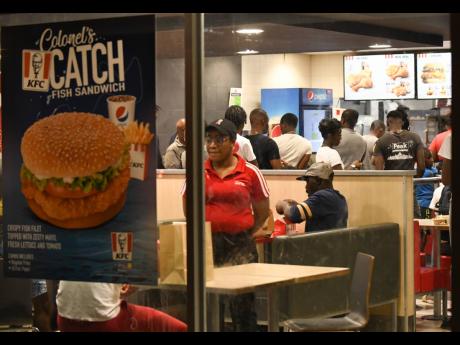Crowd crackdown - $1m fine looms as Gov’t bans mass gatherings, closes bars, nightclubs
In a bid to contain the local spread of the COVID-19 disease, Prime Minister Andrew Holness yesterday announced a raft of restrictions including limiting gatherings in public spaces to 20 persons or fewer, prompting operators of KFC, Jamaica’s largest fast food chain, to implement changes to its operations.
The restriction will be in place initially for a week starting tomorrow.
Holness, while outlining the new ground rules at a press conference at Jamaica House following a Cabinet meeting, also ordered bars, nightclubs and other entertainment venues closed during the period.
However, he said that markets, supermarkets, restaurants, corner shops, pharmacies and gas stations will continue to be open, but said that social-distancing guidelines, with people one metre apart, should be observed. Markets will be open from 6 a.m. to 2 p.m.
Restaurants of Jamaica (ROJ), which operates KFC and Pizza Hut in Jamaica, said it has already implemented changes to its operations since the virus was confirmed in Jamaica a week ago.
According to Tina Matalon, ROJ marketing director, starting tomorrow, there will be no dining inside its restaurants, limiting customers to takeout and drive-through channels.
ROJ will also limit the number of customers in its restaurants to no more than 20 persons at any time.
Further, designated floor markers will be installed to keep customers in compliance with the social-spacing guidelines.
Meanwhile, Holness also announced that all non-essential work, in both the public and private sector, should be done from home.
“We are going to be asking the permanent secretaries to examine all functions within their respective ministries, departments and agencies and, where they are considered to be non-essential, that those be carried on at home or remotely. The same is required by private sector,” Holness said.
However, he walked back that absolute declaration, suggesting that he did not want mass business closures.
The prime minister also announced public transport restrictions at the press conference.
“Under this order, the JUTC (Jamaica Urban Transit Company) will be required to only carry passengers seated … . In terms of taxis, they are required to carry one less passenger than they are licensed to do,” Holness said.
The prime minister said that a review of the measures implemented pursuant to Section 26 of the Disaster Risk Management Act 2015 will come after five days.
COMPLY OR ELSE
Meanwhile, Attorney General Marlene Malahoo Forte outlined the penalties for failing to comply with the new restrictions.
“As a result of the orders made … if you fail to comply essentially, you are liable to a fine of $1 million or imprisonment not exceeding 12 months. Be warned, the laws will be enforced,” the attorney general said.
Under the new order, there will also be changes to how hospitals across the island operate, according to Health and Wellness Minister Dr Christopher Tufton.
“One person visit per day per patient,” Tufton said of the new visiting arrangements at the nation’s hospitals. “Normally when persons visit hospitals to look for their loved ones, they go in a group … . We are trying to restrict that in keeping with people movement and the possibility of contamination.”
He said that the ministry was putting in place a protocol in relation to day and outpatient clinics, whose operations, he indicated, would be scaled back in keeping with social-distancing guidelines.
There will also be additional changes from persons travelling to the island.
“There will be a requirement for a two-week quarantine period for all persons entering the country from a country where there is internal spread of the virus. We know that will significantly impact persons who are coming into Jamaica, but it is one of the most effective methods used,” Tufton said.
The United States and the United Kingdom, which are the source of most travellers to the island, have recorded thousands of COVID-19 cases.
Since Jamaica confirmed its first case of COVID-19 – which is caused by the SAR-CoV-2 virus – there have been 11 more confirmed cases.
There have been more than 180,000 cases of the disease in 155 countries, which has claimed at least 7,000 lives.

